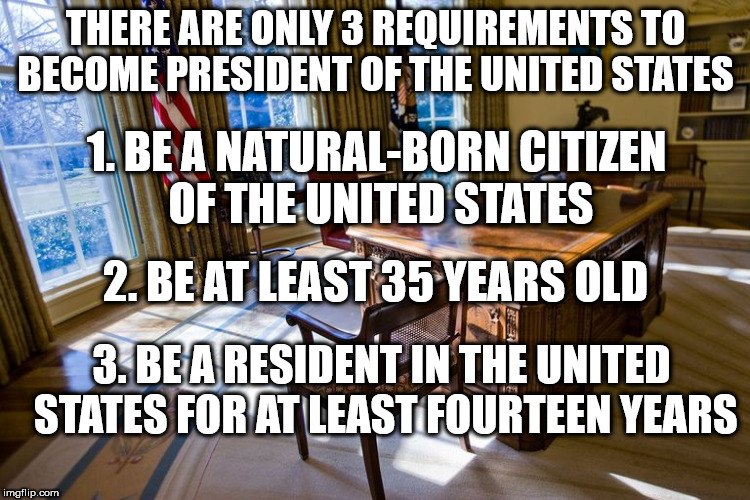To become President of the United States, candidates must navigate an intricate landscape defined by constitutional mandates, political dynamics, and public perception. Understanding these fundamental requirements is essential for any aspiring leader or engaged citizen.
The process of becoming President is not merely about ambition; it is rooted in the foundational principles of American democracy. The three primary requirements set forth in the U.S. Constitution ensure that candidates possess the necessary qualifications to lead the nation. This article will delve into these requirements, providing a comprehensive understanding of what it takes to hold the highest office in the land.
In addition to the constitutional requirements, this article will explore the broader context of political eligibility, including the role of public opinion, party support, and the significance of experience in governance. By the end of this article, readers will have a clearer picture of what it truly means to aspire to the presidency and the critical factors that influence this prestigious pursuit.
Table of Contents
- 1. Natural-Born Citizen
- 2. Age Requirement
- 3. Residency Requirement
- Political Eligibility Beyond Constitutional Requirements
- The Significance of Experience in Governance
- The Role of Public Opinion and Party Support
- Challenges in the Presidential Race
- Conclusion
1. Natural-Born Citizen
The first requirement to become President is that the candidate must be a natural-born citizen of the United States. This clause, found in Article II, Section 1 of the Constitution, is fundamental in ensuring that the President has a strong allegiance to the nation.
Being a natural-born citizen means that the individual must have been born on U.S. soil or born to U.S. citizen parents abroad. This requirement was instituted to prevent foreign influence in the presidency, safeguarding the office from those who may have divided loyalties.
2. Age Requirement
The second requirement stipulates that a presidential candidate must be at least 35 years old. This age limit reflects the framers' intention to ensure that the President possesses a level of maturity and life experience necessary for the responsibilities of the office.
Requiring candidates to be at least 35 years old encourages a candidate pool that has had sufficient time to engage in political, professional, and personal development. This age requirement serves as a safeguard against electing someone who may lack the necessary judgment and wisdom expected of a national leader.
3. Residency Requirement
The final constitutional requirement is that the candidate must have been a resident of the United States for at least 14 years. This stipulation ensures that the President is familiar with American society, culture, and the political landscape.
Residency fosters a deeper understanding of the challenges faced by citizens and allows prospective presidents to connect with the electorate on a personal level. It is an essential component of the qualifications, as a leader must be attuned to the needs and concerns of the populace they serve.
Political Eligibility Beyond Constitutional Requirements
While the Constitution outlines the fundamental prerequisites for presidential candidates, several additional factors influence political eligibility. These factors may include party affiliation, endorsements, and fundraising capabilities.
- Party Affiliation: Most presidential candidates are affiliated with a political party, which provides a support network and resources to mount a successful campaign.
- Endorsements: Gaining endorsements from influential figures and organizations can significantly enhance a candidate's credibility and visibility.
- Fundraising: The ability to raise funds is crucial for campaigning effectively; candidates need substantial financial resources to reach voters and promote their platforms.
The Significance of Experience in Governance
Experience in governance plays a vital role in a candidate's qualifications for the presidency. Many successful presidents have held prior political office, such as governor, senator, or congressperson, which equips them with the skills and understanding necessary for national leadership.
Experience allows candidates to navigate the complexities of government, build alliances, and develop policies that resonate with the American public. While it is not a constitutional requirement, the public often favors candidates with a proven track record in leadership and public service.
The Role of Public Opinion and Party Support
Public opinion significantly influences a candidate's viability in the presidential race. Candidates must resonate with voters' values and priorities to gain widespread support. This support is often reflected in polls, which can impact a candidate's momentum and fundraising efforts.
Party support is equally crucial, as political parties often provide the infrastructure, resources, and platform necessary for candidates to campaign effectively. Candidates who align closely with their party's ideals and garner support from party leaders are more likely to succeed in securing the nomination.
Challenges in the Presidential Race
The journey to the presidency is fraught with challenges, including primary elections, debates, and the general election campaign. Candidates must navigate these hurdles while maintaining their message and connecting with voters.
Challenges may also arise from opposition research, media scrutiny, and the necessity of fundraising in a competitive landscape. Candidates must be prepared to address these obstacles and adapt their strategies to remain viable in the race.
Conclusion
In summary, the three primary requirements to become President of the United States are being a natural-born citizen, meeting the age requirement of 35 years, and having resided in the U.S. for at least 14 years. These constitutional mandates ensure that candidates possess the necessary qualifications to lead the nation.
However, beyond these requirements, political eligibility is shaped by factors such as party support, fundraising capabilities, and governance experience. Aspiring candidates must navigate a complex landscape to connect with voters and overcome the challenges of the presidential race.
As you reflect on these requirements and factors, consider engaging with the political process. Whether by voting, discussing issues with friends, or exploring potential candidates, your involvement can make a difference.
We encourage you to share your thoughts in the comments below, explore other articles on our site, and stay informed about the ever-evolving landscape of American politics.
/requirements-to-serve-as-president-3322199-v4-5b5b6d8746e0fb0025f96b90.png)



